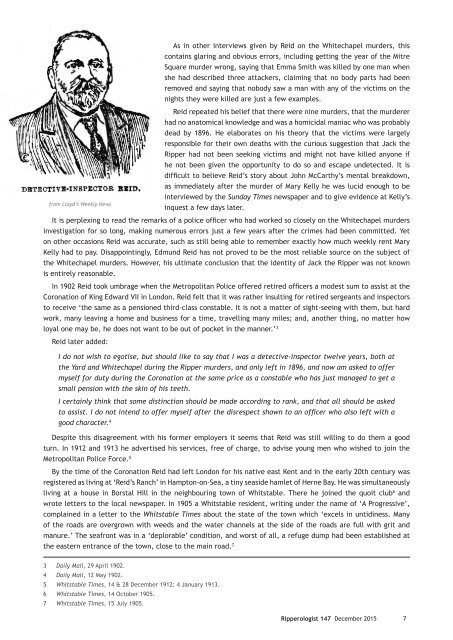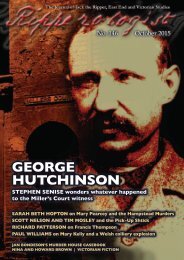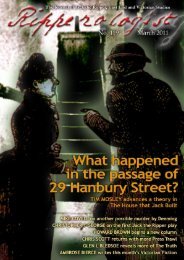Edmund Reid
nuhf574
nuhf574
Create successful ePaper yourself
Turn your PDF publications into a flip-book with our unique Google optimized e-Paper software.
As in other interviews given by <strong>Reid</strong> on the Whitechapel murders, this<br />
contains glaring and obvious errors, including getting the year of the Mitre<br />
Square murder wrong, saying that Emma Smith was killed by one man when<br />
she had described three attackers, claiming that no body parts had been<br />
removed and saying that nobody saw a man with any of the victims on the<br />
nights they were killed are just a few examples.<br />
from Lloyd’s Weekly News<br />
<strong>Reid</strong> repeated his belief that there were nine murders, that the murderer<br />
had no anatomical knowledge and was a homicidal maniac who was probably<br />
dead by 1896. He elaborates on his theory that the victims were largely<br />
responsible for their own deaths with the curious suggestion that Jack the<br />
Ripper had not been seeking victims and might not have killed anyone if<br />
he not been given the opportunity to do so and escape undetected. It is<br />
difficult to believe <strong>Reid</strong>’s story about John McCarthy’s mental breakdown,<br />
as immediately after the murder of Mary Kelly he was lucid enough to be<br />
interviewed by the Sunday Times newspaper and to give evidence at Kelly’s<br />
inquest a few days later.<br />
It is perplexing to read the remarks of a police officer who had worked so closely on the Whitechapel murders<br />
investigation for so long, making numerous errors just a few years after the crimes had been committed. Yet<br />
on other occasions <strong>Reid</strong> was accurate, such as still being able to remember exactly how much weekly rent Mary<br />
Kelly had to pay. Disappointingly, <strong>Edmund</strong> <strong>Reid</strong> has not proved to be the most reliable source on the subject of<br />
the Whitechapel murders. However, his ultimate conclusion that the identity of Jack the Ripper was not known<br />
is entirely reasonable.<br />
In 1902 <strong>Reid</strong> took umbrage when the Metropolitan Police offered retired officers a modest sum to assist at the<br />
Coronation of King Edward VII in London. <strong>Reid</strong> felt that it was rather insulting for retired sergeants and inspectors<br />
to receive ‘the same as a pensioned third-class constable. It is not a matter of sight-seeing with them, but hard<br />
work, many leaving a home and business for a time, travelling many miles; and, another thing, no matter how<br />
loyal one may be, he does not want to be out of pocket in the manner.’ 3<br />
<strong>Reid</strong> later added:<br />
I do not wish to egotise, but should like to say that I was a detective-inspector twelve years, both at<br />
the Yard and Whitechapel during the Ripper murders, and only left in 1896, and now am asked to offer<br />
myself for duty during the Coronation at the same price as a constable who has just managed to get a<br />
small pension with the skin of his teeth.<br />
I certainly think that some distinction should be made according to rank, and that all should be asked<br />
to assist. I do not intend to offer myself after the disrespect shown to an officer who also left with a<br />
good character. 4<br />
Despite this disagreement with his former employers it seems that <strong>Reid</strong> was still willing to do them a good<br />
turn. In 1912 and 1913 he advertised his services, free of charge, to advise young men who wished to join the<br />
Metropolitan Police Force. 5<br />
By the time of the Coronation <strong>Reid</strong> had left London for his native east Kent and in the early 20th century was<br />
registered as living at ‘<strong>Reid</strong>’s Ranch’ in Hampton-on-Sea, a tiny seaside hamlet of Herne Bay. He was simultaneously<br />
living at a house in Borstal Hill in the neighbouring town of Whitstable. There he joined the quoit club 6 and<br />
wrote letters to the local newspaper. In 1905 a Whitstable resident, writing under the name of ‘A Progressive’,<br />
complained in a letter to the Whitstable Times about the state of the town which ‘excels in untidiness. Many<br />
of the roads are overgrown with weeds and the water channels at the side of the roads are full with grit and<br />
manure.’ The seafront was in a ‘deplorable’ condition, and worst of all, a refuge dump had been established at<br />
the eastern entrance of the town, close to the main road. 7<br />
3 Daily Mail, 29 April 1902.<br />
4 Daily Mail, 12 May 1902.<br />
5 Whitstable Times, 14 & 28 December 1912; 4 January 1913.<br />
6 Whitstable Times, 14 October 1905.<br />
7 Whitstable Times, 15 July 1905.<br />
Ripperologist 147 December 2015 7




